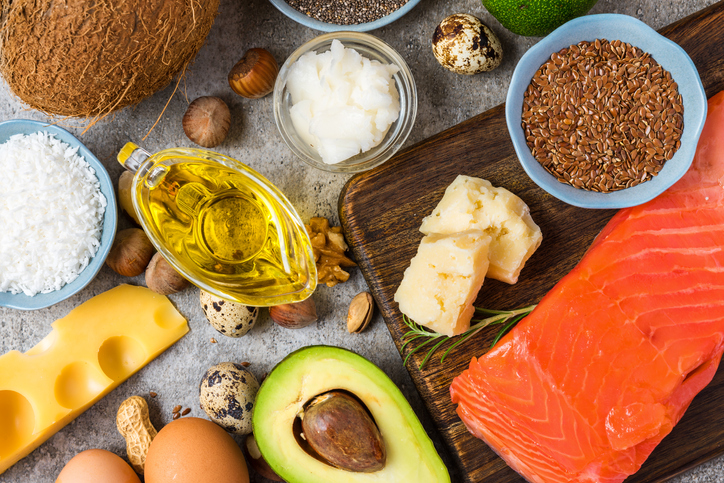You may have heard that eating foods rich in omega-3 fats could help to keep you healthy. This Food Fact Sheet looks at which foods contain omega-3 fats, how much we need and the benefits for our health.
What are omega-3 fats?
Omega-3s are a family of fats that are important for your health.
- Alpha-linolenic acid (ALA) is an essential dietary fat. You need ALA to make other omega-3 fats called long-chain (LCN-3).
- Eicosapentaenoic acid (EPA) and Docosahexaenoic acid (DHA) are LCN-3 fats. ALA makes these in your body. This happens slowly and only small amounts are formed.
- EPA and DHA are important for your heart, blood vessels, lungs and the immune and hormone systems.
- DHA is also important for the development of the retina (eyes) and brain in infants.

Where do omega-3 fats come from?
Nuts and seeds, and their oils, contain ALA - walnuts, flaxseeds and rapeseed oil are particularly good sources. Fish and especially oily fish are good sources of EPA and DHA.
White fish (cod, haddock, plaice, pollack, coley, dover sole, dab, flounder, red mullet and gurnard) and shellfish contain some LCN-3, but at much lower levels than oily fish.
You should try and include both types of fish in your usual diet. Some foods have DHA added (fortified). Human milk contains DHA and infant formulas must have this fat added. The best way of ensuring we are getting enough omega-3 is to eat foods rich in these fats.
Which fish/seafood are good sources of omega-3?
These are examples of good fish/seafood sources of omega-3:
- mackerel
- kippers
- pilchards
- trout
- sprats
- salmon
- herring
- sardines
- crab (fresh)
- whitebait
- swordfish
Benefits of eating oily fish
People from countries such as Japan and Greenland who eat a diet rich in omega-3s, have been shown to have a lower risk of heart disease than other countries including the UK Because of this and other health benefits, the NHS recommends you eat more foods containing omega-3.
As well as omega-3, fish are good sources of other nutrients and:
- Provide vitamins A and D, protein, and minerals such as iodine, calcium, and selenium
- May protect the heart and blood vessels from disease
- Support the healthy development of your baby during pregnancy and breastfeeding
- May help to maintain good memory and the prevention and treatment of depression
Sustainability
The richest dietary sources of long-chain omega-3 fats are marine fish oils. The omega-3 in fish comes from micro-algae, small plants found in water.
Stocks of some fish species like wild salmon and trout are declining. So, to ensure the sustainability of our fish stocks, you can try to choose fish from sustainable sources. Look for products certified by the Marine Stewardship Council. The Good Fish Guide from the Marine Conservation Society provides details of sustainable fish sources.
How much should we eat?
You should try to eat two portions of fish per week, one of which should be oily, to get the most benefit.
Portion size guide for adults and children
|
Age |
One portion size |
|
18 months to three years |
¼ - ¾ small fillet or one to three tablespoons |
|
four to six years |
½ – one small fillet or two to four tablespoons |
|
seven to eleven years |
one – 1 ½ small fillets or four to six tablespoons |
|
12 years to adult |
140g (5 oz) fresh fish or one small can oily fish |
Is eating fish safe?
Some types of fish (shark, swordfish and marlin) may be high in mercury. This chemical may be harmful to the developing nervous system in babies. Avoid these fish if you are pregnant, planning to become pregnant or under 16 years old. All other adults, including those who are breastfeeding, should eat no more than one portion of these fish per week.
If you are past childbearing age or not intending to have children, you can eat up to four portions of all other fish per week. You can safely have up to two portions of oily fish per week if you are pregnant, breastfeeding, planning a pregnancy or may become pregnant in future.
What if I don’t like or eat fish?
If you do not eat fish or you eat a vegan, vegetarian or plant-based diet, you can get omega-3 from:
- nuts and seeds (e.g. walnuts, pumpkin and chia seeds)
- vegetable oils (e.g. rapeseed and linseed)
- soya and soya products (e.g. beans, milk and tofu)
Omega-3 enriched foods
If your diet is plant-based or you are vegetarian, foods that are acceptable to you and have had omega-3 added can also be useful sources. These include certain brands of eggs, milk, yoghurt, bread, and spreads. Check the labels to make sure.
Supplements
Omega-3 supplements are not recommended in the UK general population. This is because evidence of benefits is inconclusive. If you are considering a supplement, you should:
- Choose omega-3 rather than fish liver oil
- Check the vitamin A content - you should not have more than a total of 1.5mg vitamin A (1500ug) a day from food and supplements combined
- Do not take supplements containing vitamin A if you are pregnant or planning to become pregnant
- Check labels for DHA and EPA content
- Choose a supplement that provides you with the same daily amount provided by eating one to two portions of fish per week (about 450mg EPA and DHA per daily adult dose)
- Choose an age-appropriate supplement – children will need less than adults
- Seek advice from a dietitian if in doubt
Some supplements contain only algae so are suitable for vegetarians and vegans.
Top tips
- Increase intake of omega-3 fats
- Eat more fish and from sustainable sources
- Limit oily fish (two portions per week) if you are pregnant or planning a baby
- Avoid shark, swordfish and marlin if pregnant, planning a baby or under 16
- Cook with an omega-3 rich oil
- Include plant-based omega-3
- Include canned fish and other fish products
- Check labels for omega-3 content
- Include fortified foods if you don’t eat fish
Source(s)
Albert, C.M., Campos, H., Stampfer, M.J., Ridker, P.M., Manson, J.E., Willett, W.C., & Ma, J. 2002. Blood levels of long-chain n-3 fatty acids and the risk of sudden death. New England Journal of Medicine, 346, (15) 1113-1118 available from: PM:11948270
Ascherio, A., Rimm, E.B., Stampfer, M.J., Giovannucci, E.L., & Willett, W.C. 1995. Dietary intake of marine n-3 fatty acids, fish intake, and the risk of coronary disease among men. New England Journal of Medicine, 332, (15) 977-982 available from: PM:7885425
Burr, M.L., Fehily, A.M., Gilbert, J.F., Rogers, S., Holliday, R.M., Sweetnam, P.M., Elwood, P.C., & Deadman, N.M. 1989. Effects of changes in fat, fish, and fibre intakes on death and myocardial reinfarction: diet and reinfarction trial (DART). Lancet, 2, (8666) 757-761 available from: PM:2571009
Calder, P, 2017, New evidence that omega 3 fatty acids have a role in primary prevention of coronary heart disease, Journal of Public Health and Emergency, available online: http://jphe.amegroups.com/article/view/3849/4641
Cheatham, C.L., Colombo, J., & Carlson, S.E. 2006. N-3 fatty acids and cognitive and visual acuity development: methodologic and conceptual considerations. American Journal of Clinical Nutrition, 83, (6 Suppl) 1458S-1466S available from: PM:16841855
Department of Health 1994. Nutritional aspects of cardiovascular disease. Report of the Cardiovascular Review Group of the Committee on Medical Aspects of Food Policy. HMSO, London.
Dolecek, T.A. 1992. Epidemiological evidence of relationships between dietary polyunsaturated fatty acids and mortality in the multiple risk factor intervention trial. Proceedings of the Society for Experimental Biology and Medicine, 200, (2) 177-182 available from: PM:1579579
Giles GE; Mahoney CR; Kanarek RB. 2013 Omega-3 fatty acids influence in mood in healthy and depressed individuals. Nutrition Reviews (71) 727-741
Hajjaji N; Bougnoux P 2013 Selective sensitization of tumors to chemotherapy by marine-derived lipids: A review. Cancer Treatment Review (39) 473-488
Helland, I.B., Saugstad, O.D., Saarem, K., van Houwelingen, A.C., Nylander, G., & Drevon, C.A. 2006. Supplementation of n-3 fatty acids during pregnancy and lactation reduces maternal plasma lipid levels and provides DHA to the infants. J.Matern.Fetal Neonatal Med., 19, (7) 397-406 available from: PM:16923694
Helland, I.B., Smith, L., Saarem, K., Saugstad, O.D., & Drevon, C.A. 2003. Maternal supplementation with very-long-chain n-3 fatty acids during pregnancy and lactation augments children's IQ at 4 years of age. Pediatrics, 111, (1) e39-e44 available from: PM:12509593
Hooper, L., Thompson, R.L., Harrison, R.A., Summerbell, C.D., Moore, H., Worthington, H.V., Durrington, P.N., Ness, A.R., Capps, N.E., Davey, S.G., Riemersma, R.A., & Ebrahim, S.B. 2004. Omega 3 fatty acids for prevention and treatment of cardiovascular disease.Cochrane.Database.Syst.Rev. (4) CD003177 available from: PM:15495044
Hu, F.B., Bronner, L., Willett, W.C., Stampfer, M.J., Rexrode, K.M., Albert, C.M., Hunter, D., & Manson, J.E. 2002. Fish and omega-3 fatty acid intake and risk of coronary heart disease in women. JAMA, 287, (14) 1815-1821 available from: PM:11939867
Kremer, J.M., Jubiz, W., Michalek, A., Rynes, R.I., Bartholomew, L.E., Bigaouette, J., Timchalk, M., Beeler, D., & Lininger, L. 1987. Fish-oil fatty acid supplementation in active rheumatoid arthritis. A double-blinded, controlled, crossover study. Ann.Intern.Med., 106, (4) 497-503 available from: PM:3030173
Kremer, J.M., Lawrence, D.A., Petrillo, G.F., Litts, L.L., Mullaly, P.M., Rynes, R.I., Stocker, R.P., Parhami, N., Greenstein, N.S., Fuchs, B.R., & . 1995. Effects of high-dose fish oil on rheumatoid arthritis after stopping nonsteroidal antiinflammatory drugs. Clinical and immune correlates. Arthritis and Rheumatism, 38, (8) 1107-1114 available from: PM:7639807
Kromhout D; De Goede J 2014 Update on cardiometabolic health effects of n-3 fatty acids. Current Opinion in Lipidology (25) 85-90
Loef M; Walach H 2013 The Omega-6/Omega-3 Ratio nad Dementia or Cognitive Decline. A Systemic Review on Human Studies and Biological Evidence. J of Nutrition in Gerontology and Geriatrics (32) 1-23
Lorente-Cebrian S; Costa AG; Navas-Carretero S; ZabalaM; Martinez JA; Moreno-Aliaga MJ. 2013 Role of Omega-3 fatty acids in obesity,metabolic syndrome, and cardiovascular diseases: A review of the evidence J Physio and Biochem (69) 633-651
Marchioli, R., Barzi, F., Bomba, E., Chieffo, C., Di Gregorio, D., Di Mascio, R., Franzosi, M.G., Geraci, E., Levantesi, G., Maggioni, A.P., Mantini, L., Marfisi, R.M., Mastrogiuseppe, G., Mininni, N., Nicolosi, G.L., Santini, M., Schweiger, C., Tavazzi, L., Tognoni, G., Tucci, C., & Valagussa, F. 2002. Early protection against sudden death by n-3 polyunsaturated fatty acids after myocardial infarction: time-course analysis of the results of the Gruppo Italiano per lo Studio della Sopravvivenza nell'Infarto Miocardico (GISSI)-Prevenzione. Circulation, 105, (16) 1897-1903 available from: PM:11997274
Mozaffarian, D., Lemaitre, R.N., Kuller, L.H., Burke, G.L., Tracy, R.P., & Siscovick, D.S. 2003. Cardiac benefits of fish consumption may depend on the type of fish meal consumed: the Cardiovascular Health Study. Circulation, 107, (10) 1372-1377 available from: PM:12642356
Richardson, A.J. & Puri, B.K. 2002. A randomized double-blind, placebo-controlled study of the effects of supplementation with highly unsaturated fatty acids on ADHD-related symptoms in children with specific learning difficulties. Progress in Neuro-Psychopharmacology and Biological Psychiatry, 26, (2) 233-239 available from: PM:11817499
Richardson, A.J. & Montgomery, P. 2005. The Oxford-Durham study: a randomized, controlled trial of dietary supplementation with fatty acids in children with developmental coordination disorder. Pediatrics, 115, (5) 1360-1366 available from: PM:15867048
Richardson, A.J. & Ross, M.A. 2000. Fatty acid metabolism in neurodevelopmental disorder: a new perspective on associations between attention-deficit/hyperactivity disorder, dyslexia, dyspraxia and the autistic spectrum. Prostaglandins Leukotrienes and Essential Fatty Acids, 63, (1-2) 1-9 available from: PM:10970706
Sanders, T.A., Hall, W.L., Maniou, Z., Lewis, F., Seed, P.T., & Chowienczyk, P.J. 2011. Effect of low doses of long-chain n-3 PUFAs on endothelial function and arterial stiffness: a randomized controlled trial. American Journal of Clinical Nutrition, 94, (4) 973-980 available from: PM:21865334
Scientific Advisory Committee on Nutrition 2004, Advice on Fish Consumption: Benefits and Risk.
Silvia Lorente-Cebrián & André G. V. Costa & Santiago Navas-Carretero & María Zabala & Laura M. Laiglesia & J. Alfredo Martínez & María J. Moreno-Aliaga, 2015, An update on the role of omega-3 fatty acids on inflammatory and degenerative diseases, J Physiol Biochem 71:341–349
Simopoulos, A.P. 2002. Omega-3 fatty acids in inflammation and autoimmune diseases.Journal of the American College of Nutrition, 21, (6) 495-505 available from: PM:12480795
Singhal, A., Lanigan, J., Low, S., Lucas, A., & Deanfield, J. E. The influence of docosaexaenoic acid supplementation on vascular function: a double-blind placebo-controlled randomised trial. Atheroscler.Suppl 12[1], 13-184. 2011.
Siscovick, D.S., Raghunathan, T.E., King, I., Weinmann, S., Wicklund, K.G., Albright, J., Bovbjerg, V., Arbogast, P., Smith, H., Kushi, L.H., & . 1995. Dietary intake and cell membrane levels of long-chain n-3 polyunsaturated fatty acids and the risk of primary cardiac arrest. JAMA, 274, (17) 1363-1367 available from: PM:7563561
van der, T.H., Tulleken, J.E., Limburg, P.C., Muskiet, F.A., & van Rijswijk, M.H. 1990. Effects of fish oil supplementation in rheumatoid arthritis. Annals of the Rheumatic Diseases, 49, (2) 76-80 available from: PM:2138449
Wang, C., Harris, W.S., Chung, M., Lichtenstein, A.H., Balk, E.M., Kupelnick, B., Jordan, H.S., & Lau, J. 2006. n-3 Fatty acids from fish or fish-oil supplements, but not alpha-linolenic acid, benefit cardiovascular disease outcomes in primary- and secondary-prevention studies: a systematic review. Am J Clin Nutr, 84, (1) 5-17 available from: PM:16825676
Zheng J.S; Hu X J; Zhao Y. M; Yang J; Li D 2013 Intake of fish and marine n-3 polyunsaturated fatty acids and risk of breast cancer: meta analysis of data from 21 independent prospective cohort studies BMJ (34) 1756-1833
Abdelhamid, A. S., Brown, T. J., Brainard, J. S., Biswas, P., Thorpe, G. C., Moore, H., J., Deane, K. H., Summerbell, C. D., Worthington, H. V., Song, F. & Hooper, L. 2020. Omega-3 fatty acids for the primary and secondary prevention of cardiovascular disease. Cochrane Database Syst Rev, 3, Cd003177.
Iso, H., Kobayashi, M., Ishihara, J., Sasaki, S., Okada, K., Kita, Y., Kokubo, Y. & Tsugane, S. 2006. Intake of fish and n3 fatty acids and risk of coronary heart disease among Japanese: the Japan Public Health Center-Based (JPHC) Study Cohort I. Circulation, 113, 195-202.







